By Kevin A. Gray
Archway Publishing
Apropos of nothing having to do with Twitter, I was listening to The Who (@TheWho) while writing this primer. For the record, the band has 441,000 followers at last check. Before you can become a Pinball…er Twitter Wizard, you’ve got to get started.
So without further adieu, and with the help of “The Who,” here’s a brief Twitter primer.
- Who Are You?: First you’ll need an account and a handle (name). Handles are limited to 15 characters (not including

the @). Using your name is one option, but it may not be available. Consider something that describes you or what you’re marketing. For example, if you were Tommy, your handle might be @PinballWizard. - The Real Me: Your profile is important, but you’ve got a 160 character limit. Make it pithy, but professional. Briefly tout your credibility (“award winning” etc). Be creative. Don’t try to be funny, unless you are funny. Include your website/blog URL and invite others to follow. You can overcome the profile length’s limitations by including an appropriate photo that further tells your story.
- I Can See for Miles: Now that you’re on Twitter, look around. Follow some prominent tweeters to see what they’re doing. In fact, StatSocial recently released “The Top-100 Social Media Power Influencers, 2015 Edition. That’s a great place to start.
- Baby Don’t Do It: You’re going to be tempted to send out oodles of tweets about your book. Don’t. Spamming is a quick way to have your account suspended. Be strategic about who you engage. Roger Daltrey would never walk into a room and start shamelessly pushing albums. Twitter is a conversation. Know the rules.
- Anyway, Anyhow, Anywhere: If you’re going to enter the Twitterverse, know that it’s a commitment. Tweeting once a day or once a week won’t cut it. Stay active and relevant.
- Going Mobile: Download the Twitter app to your Android or iPhone. Staying engaged is easier if Twitter is always with you, even if you’re embarking on your second or third farewell tour.
- However Much Booze: This may sound obvious, but if you’re knocking back beers backstage with your favorite band; it’s best to put Twitter away for the night.
These are just a few tips you can follow. How are you using Twitter to market your book?
-AWP-





